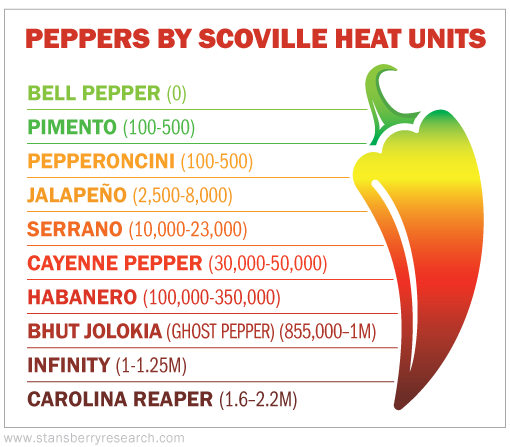It's a food that only humans enjoy...
Most animals avoid it. And the ones that do eat it – like birds – are immune to its effects.
Eat too much of it and you could experience acid reflux, seizures, heart attacks, and even death. But its health benefits are incredible.
I'm talking about hot peppers.
The chemical responsible for a pepper's hotness, capsaicin, is an irritant. All other animals avoid the unpleasant burning sensations caused by hot peppers. But humans enjoy the pain – cultures everywhere have spicy dishes.
That's because capsaicin directly interacts with a receptor on our tongues called the vanilloid receptor, or TRV 1. TRV 1 helps us regulate our body temperature. When capsaicin triggers it, your brain thinks your tongue is actually on fire.
The heat of a pepper is measured in Scoville units. The more Scoville units, the hotter the pepper.

The hottest pepper in the world – the Carolina Reaper – has more than 2 million Scoville units. To compare, a jalapeno has about 2,500 to 8,000.
You can search the Internet for videos of people who've taken on the challenge of eating some of the world's hottest peppers and see similar reactions: sweating, coughing, and an overwhelming burning sensation.
That sounds awful, but the relief that comes after eating a hot pepper is what makes people enjoy it.
You see, once your brain thinks your tongue is on fire, it fires off a lot of endorphins and dopamine – feel-good chemicals that bring on a state of relief and happiness. Plus, the endorphins shut down the pain receptors from experiencing more pain. So you essentially get pain relief in the wake of that initial shock.
But peppers don't just bring happiness and pain relief. Several areas of study have shown promising results that capsaicin could help you live longer and even prevent cancer.
In 2015, researchers at the Chinese Academy of Medical Sciences made headlines with their new study. Reporters detailed it as "eating spicy foods increases lifespan."
Their study looked mostly promising. Close to half a million adults, aged 30 to 79, responded to food surveys for a period of seven years. Those who ate spicy foods six or seven times a week had a 14% lower risk of mortality during the study than those who ate spicy meals once a week or less.
Spice, in this case, was a measure of chili – fresh chilies, chili flakes, and chili oil.
Of course, there are some considerations for this study – so don't run out and buy a bushel of ghost chilies just yet.
First, the Chinese population consumes peppers far more than many other countries. In fact, the study says up front that chili peppers are one of the most popular foods in the nation. That could skew some of the results.
And as Alice Lichtenstein of Tufts University points out, people in good health may enjoy a wider variety of foods, including spicier dishes.
Even though this is an association study instead of a cause-and-effect, we think there's truth to the overall health claims.
For instance, we know that capsaicin interacts with not just TRV 1, but also with a protein called "nuclear factor kappa-light-chain-enhancer of activated B cells" or NF-kB for short. NF-kB helps us regulate our immune systems. It signals our cells to respond to threats like bacteria, viruses, and stress.
A 2017 study, published through the American Society for Microbiology, investigated the effect of capsaicin on the gut bacteria of mice fed a high-fat diet for 12 weeks.
The researchers found that mice that ate a high-fat diet and capsaicin lacked signs of chronic low-grade inflammation, versus the mice that didn't have capsaicin.
They also found capsaicin to have a protective effect on the tissues lining the mice's intestines, effectively reducing their chances of developing leaky gut syndrome – gut bacteria and toxins leeching through inflamed gaps in the intestinal walls and entering the bloodstream.
Cayenne pepper is often used in Mexican food, Indian curries, Thai soups, and even in some homemade gravies. When adding cayenne to a recipe, use at least a teaspoon of powder per cup of water. This is one of my favorite heat-spice flavors... but I wish I could stand more heat. I also enjoy red pepper flakes in a bowl of chili and I'll eat jalapenos (without seeds) on sandwiches.
How do you like to enjoy your peppers? Share your tips with us at [email protected].
What We're Reading...
- Five reasons to keep cayenne pepper in your spice cupboard.
- Something different: Here's how to find the perfect fitness tracker.
Here's to our health, wealth, and a great retirement,
Dr. David Eifrig and the Health & Wealth Bulletin Research Team
February 22, 2022
